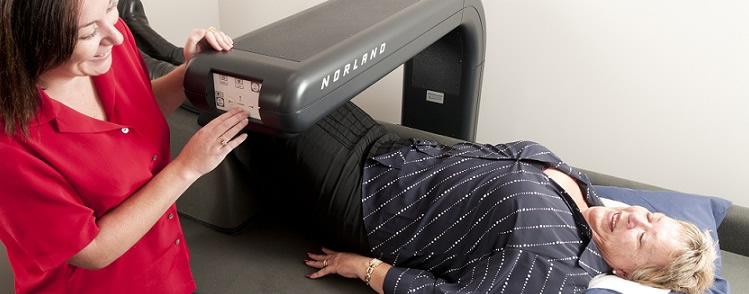
Bone Density Scans Performed by the Midland Osteoporosis Group
How strong are your bones?
How to find out if you are at risk of osteoporosis.
Osteoporosis is the weakening of bone that causes bones to break easily. It affects both men and women. Estimates vary, but as many as one in three women and one in five men will suffer a fracture due to osteoporosis. The consequences of osteoporosis include pain, disability, deformity and lost independence.
The key to osteoporosis is to find out how strong your bones are, before you have a broken bone. As soon as you know you have lost some bone strength or "density", you can take action to help prevent any further weakening.
A Bone density scan is a test to measure bone strength. When you have your bone density scan, you will be asked to lie on a table. The scanner has an "arm". It moves above you but does not touch you. Please wear clothing without large buckles, metallic buttons and zips. The scan takes about 20-30 minutes; in which time you will hear quiet machine noise and the bed and scanning arm will move. The technician will tell you when they are finished scanning; and the images and the report will be sent to you in the mail.
Osteoporosis
Bones change throughout your life. After teenagers stop growing, bone density increases in the average person until around age 30 years. At this time, bone density may plateau or bone loss starts to occur at around 1% per year. Osteoporosis occurs when not enough new bone is formed or when too much bone is lost. Accelerated bone loss may occur for a number of lifestyle or physical factors covered later in "risk factors".
For women, the decrease in oestrogen production at menopause results in bone loss, which for some women may be rapid and severe. As men and women age, additional bone loss can occur for a variety of reasons. For example: because women generally have smaller, thinner frames than men; and because women go through menopause. Other factors such as diet, lack of exercise, smoking and alcohol use contribute to bone fragility in both sexes.
How do I know if I have osteoporosis?
Strong bone - osteoporotic bone
A test to measure bone density can be performed by The Bone Density Service on a DEXA scanner. This examination uses minimal radiation dose, and produces a report giving readings of bone density in relation to an average for a person of your size and weight. A report is generated by the Radiologist or Rheumatologist and sent to both you and your Doctor.
Risk factors
The only way to know your bone density is to have it measured. Risk factors are helpful when identifying people more likely to develop osteoporosis, but they cannot tell you what the density of your bone is.
Risk factors that increase your chances of developing osteoporosis are:
- being female
- a small thin frame
- advanced age
- a family history of osteoporosis
- early menopause
- abnormal absence of periods (amenorrhea)
- anorexia nervosa or bulimia
- a diet low in calcium
- use of certain medications, (eg. Steroids, anticonvulsants, thyroxine)
- low testosterone levels in men
- a sedentary lifestyle
- cigarette smoking
- excessive alcohol intake
- malabsorption problems
What can bone density tell me and my doctor?
A bone density test can:
- detect low bone density before a fracture occurs
- predict any increased risk of future fracture
- confirm a diagnosis of osteoporosis
- determine your rate of bone loss, if you have serial studies
- monitor the effect of any treatment you are having for osteoporosis
What if I find out if I have osteoporosis?
There are treatments available which can slow the loss of bone density, and make bone fractures caused by osteoporosis less likely. Since oestrogen is important in maintaining bone in women, doctors often prescribe Hormone Replacement Therapy to prevent or treat osteoporosis.
For both men and women already suffering from osteoporosis, doctors may prescribe medications. In addition, a calcium-rich diet, Vitamin D, exercise and a healthy lifestyle are part of the osteoporosis treatment program your doctor will discuss with you.
What do I do now?
To make an appointment or if you have any queries please phone your nearest branch today.
Waikato Bone Density Services
- Rototuna Shopping Complex, Cnr Horsham Downs and Thomas Roads, Hamilton.
- Glenview Medical Centre, 1 Urlich Avenue, Glenview, Hamilton
Phone: 0800 HAMRAD (426 723)
Coromandel Bone Density Service
Manaaki Building, Mary Street, Thames Hospital, Thames. Phone: 0800 426 723